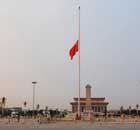Rescue & Aid
100,000 people need tents in quake-hit Yushu
(Xinhua)
Updated: 2010-04-15 19:00
 |
Large Medium Small |
BEIJING - About 8,370 tents have been shipped to the quake zone in China's northwestern Qinghai Province since it was hit by a major earthquake Wednesday, said an official with the Ministry of Civil Affairs Thursday.
The number of tents arriving in Yushu prefecture Thursday was expected to reach 10,000 and 28,800 more would be sent, said Zou Ming, director of the disaster relief department with the ministry, at a press conference.
The region was hit by a 7.1-magnitude earthquake, leaving about 600 people dead, 313 people missing and 9,110 injured.
About 100,000 people had been left homeless.
"The tents will be enough for about 100,000 people," he said. "The problem is that transport is tight. We are going to need some more time to ship all of the materials."
"Tents, winter clothes, quilts and instant foods are most needed in the quake-hit region," he said.
The ministry had asked the armed forces to help, he said. About 100,000 packaged meals had been airlifted from Xi'an, in Shaanxi Province, to Yushu.
The provinces of Guangdong, Fujian, Zhejiang, Jiangsu and Shandong would contribute a total of 30 tonnes of instant foods.
"I believe the difficulties in the quake-hit region will be greatly eased when all these relief materials reach there," he said.
Given the lack of transportation, Zou suggested people donate money or show support in other ways rather than donate relief materials.
"The rehabilitation of the quake-hit region, such as rebuilding homes and other infrastructure, will require funds," he said.












